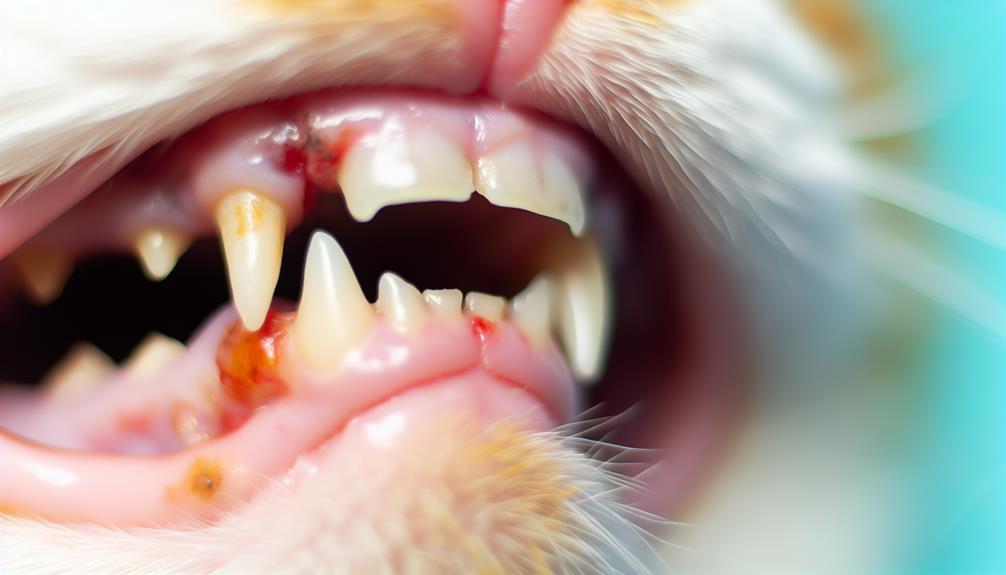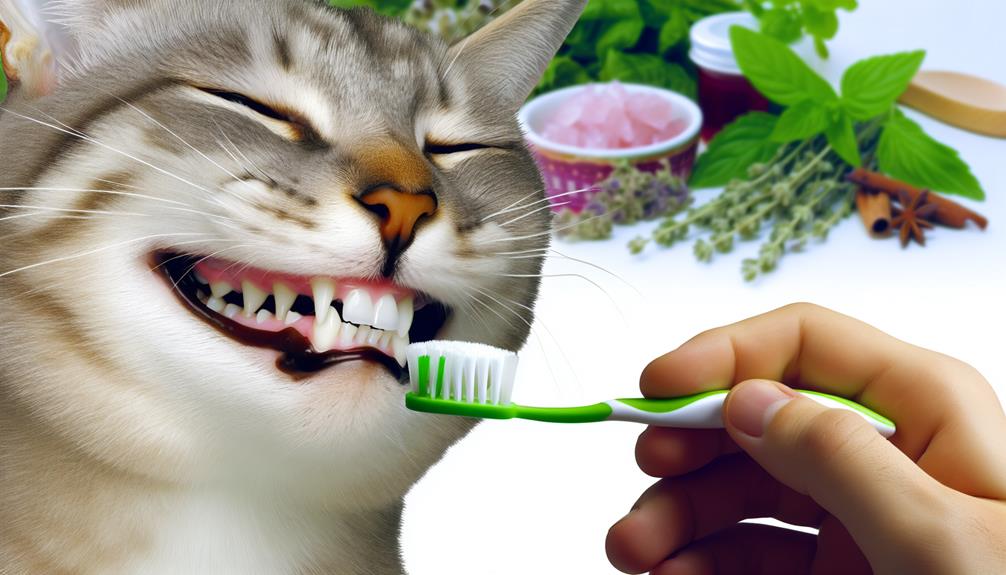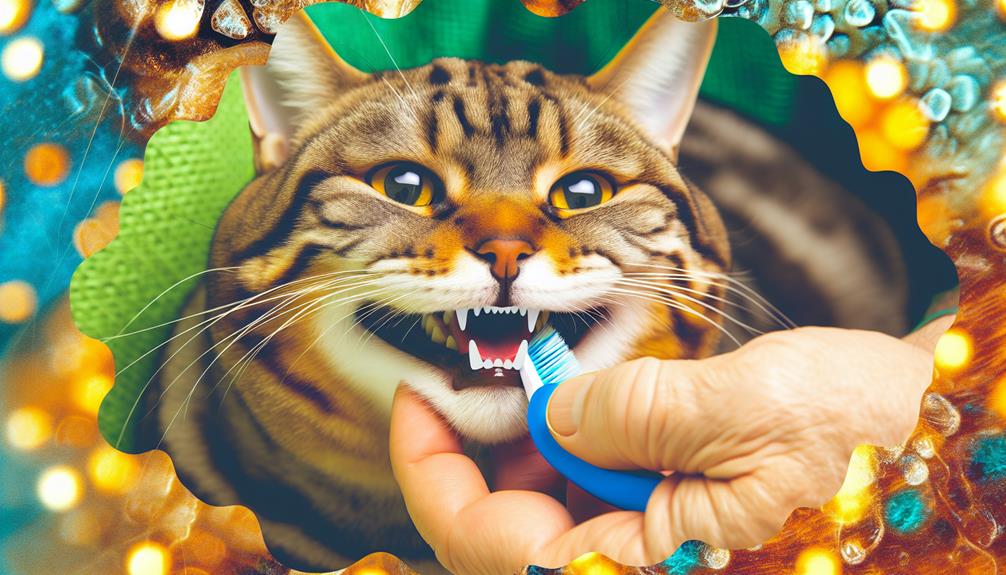Do you ever wonder why your cat might have dental problems? It's important to take care of our furry friends' teeth, just like we take care of our own. But sometimes we might not notice when our cats have dental issues. So, why is it important to pay attention to their dental health? Well, let's find out together! In this discussion, we'll explore the signs of dental problems in cats, what can happen if these problems are left untreated, and why it's essential to take care of their teeth. Get ready to discover the importance of cat dental care and the potential complications that can arise if we neglect it.
Key Takeaways
Key Takeaways:
- It's important for cat owners to watch for signs of dental problems in their cats.
- Changes in behavior and physical symptoms can indicate dental issues that need attention.
- Ignoring dental problems can lead to bigger health problems for cats.
- Preventive measures and regular dental care can keep a cat's mouth healthy and their whole body happy.
- Pay attention to signs of dental problems and take action if anything seems unusual.
Common Signs of Dental Problems
Discover the Signs of Dental Problems in Cats!
Did you know that cats can have dental problems just like humans? It's true! Tooth decay and gum inflammation are two common issues that cats can experience. But don't worry, we're here to help you understand the signs of dental problems in your furry friend so you can take action and keep them healthy.
Signs to Look Out For:
- Bad Breath: If your cat's breath smells really stinky and it doesn't go away, it could be a sign of tooth decay or gum disease.
- Difficulty Eating: If your cat seems to be having trouble eating or chewing their food, it could be because their mouth is hurting. They might even start avoiding their food or chewing on one side of their mouth.
- Excessive Drooling: If you notice that your cat is drooling more than usual, it could be a sign of gum inflammation or mouth pain.
- Behavioral Changes: Cats with dental problems might become more aggressive or irritable. This is because they're in discomfort and it's making them grumpy. Keep an eye out for any changes in their behavior.
How to Prevent Dental Problems:
- Regular Check-ups: Taking your cat to the vet for regular dental check-ups is important. The vet can catch any problems early and treat them before they get worse.
- Brush Their Teeth: Yes, you read that right! You can actually brush your cat's teeth. Use a special cat toothbrush and toothpaste and gently brush their teeth a few times a week.
- Dental Treats and Toys: There are special treats and toys designed to help keep your cat's teeth clean. These can be a fun way to promote good oral hygiene.
- Balanced Diet: Feeding your cat a balanced diet can contribute to their oral health. Talk to your vet about the best food choices for your furry friend.
Behavioral Changes Indicating Dental Issues
Why is My Cat Acting Strange? It Could Be a Dental Issue!
Did you know that cats can have dental problems just like humans? Yep, it's true! And sometimes, these dental issues can cause some strange behaviors in our furry friends. So, if you've noticed your cat acting a little off lately, it might be time to check their teeth. Here are three signs that could indicate dental problems in cats:
- Trouble Eating: Have you seen your cat struggling to chew their food or taking forever to finish a meal? Well, it could be because their teeth hurt. Cats with dental issues might drop food from their mouth or avoid certain foods altogether. So, if your cat is having trouble eating, it's time to take a closer look at their pearly whites.
- Stinky Breath: We all know that cats don't always have the freshest breath, but if it suddenly smells really bad, it could be a sign of dental problems. Foul-smelling breath can mean there's a dental disease or infection going on. Don't ignore it, because bad breath can be a symptom of more serious dental issues.
- Changes in Behavior: Dental pain can make cats cranky and irritable. So, if your usually friendly and social cat is suddenly avoiding you or acting aggressive, it could be because their teeth hurt. They might also become less active or lose interest in playing with their favorite toys. If you notice any strange changes in your cat's behavior, it's best to talk to a vet about their dental health.
Physical Symptoms of Dental Problems
What are the Signs of Dental Problems in Cats?
Cats can't talk, so how can we tell if they have dental problems? Well, there are some physical signs that we can look out for. Let's explore these signs together!
- Bad Breath: Have you ever been close to your cat and noticed a stinky smell coming from their mouth? That's called bad breath or halitosis. It can be a sign of tooth decay or gum disease. But remember, bad breath alone doesn't mean your cat has dental problems, it's just a clue.
- Swollen Gums: Another sign to watch out for is swollen gums, also known as gingivitis. This happens when there's a lot of plaque and tartar buildup on your cat's teeth. Their gums may look red and inflamed, and they might even bleed easily. Ouch!
- Difficulty Eating: Imagine trying to eat your favorite snack with a toothache. It wouldn't be fun, right? Cats with dental problems might have a hard time eating too. They might not have a big appetite, drop their food while eating, or prefer softer foods. It's like they're saying, "My teeth hurt, please give me something easy to chew!"
- Signs of Pain or Discomfort: When cats have dental problems, they may show signs of pain or discomfort. They might paw at their mouth or drool a lot more than usual. It's their way of telling us, "Hey, something's not right in here!"
Now, why is it important to pay attention to these signs? Well, if we don't take care of dental problems in cats, they can get worse. They might have to get their teeth extracted or develop more serious gum disease. Yikes!
That's why it's essential to recognize these physical symptoms and take our furry friends to the vet if we notice anything unusual. Remember, a healthy mouth means a happy cat!
Complications From Untreated Dental Issues
Why Ignoring Your Cat's Dental Health Can Be a Big Problem
Did you know that dental issues in cats can lead to serious complications? It's true! Neglecting your cat's dental health can have a negative impact on their overall well-being. Let's take a closer look at three key reasons why untreated dental problems can be a big problem for our feline friends:
- Ouch! Pain and Discomfort:
- Cats with dental problems often experience pain and discomfort.
- This can make it hard for them to eat, leading to weight loss and malnutrition.
- They might also show changes in their behavior, like being more aggressive or withdrawn, as they try to deal with the pain.
- Yikes! Infections:
- Dental issues can create a perfect environment for bacteria to grow.
- If left untreated, these infections can spread from the mouth to other parts of the body, like the kidneys or heart.
- This can cause serious health problems and can even be life-threatening in severe cases.
- Uh-oh! Organ Damage:
- Dental problems don't just stay in the mouth – they can harm other parts of the body too.
- Bacteria from dental infections can travel through the bloodstream and damage important organs like the liver or kidneys.
- Over time, this can lead to long-term organ damage.
So, what can we do to prevent these complications and keep our furry friends healthy? It's simple – address and treat dental issues promptly! By taking care of your cat's dental health, you can help prevent pain, infections, and organ damage. Your cat will thank you for it!
Preventive Measures for Cat Dental Care
Take Care of Your Cat's Teeth: Easy Ways to Keep Them Healthy!
Did you know that cats can have dental problems, just like humans? It's true! And just like us, they need regular dental care to keep their teeth and gums in tip-top shape. But don't worry, taking care of your cat's teeth doesn't have to be a hassle. There are simple things you can do to prevent dental issues and keep your furry friend's smile bright and healthy.
- Dental treats: Treats designed specifically for cats can be a game-changer when it comes to their dental health. These tasty treats are made to reduce plaque buildup and freshen your cat's breath. Plus, their crunchy texture helps remove tartar from their teeth, which can prevent dental problems from popping up.
- Cat-friendly toothpaste: Yes, you read that right. Cats can use toothpaste too! Just like you brush your teeth, you can brush your cat's teeth too. But make sure to use toothpaste that is formulated specifically for cats. Human toothpaste can be toxic to them, so it's important to use the right kind. Regular brushing can remove plaque and keep tartar at bay.
- Dental toys: Who says toys are just for play? Dental toys can actually help improve your cat's dental health. These special toys are designed to clean teeth and massage gums as your cat chews and plays with them. It's a win-win situation – your cat gets to have fun, and their teeth get a good cleaning too.
Frequently Asked Questions
How Often Should I Brush My Cat's Teeth?
Frequently Asked Questions:
Q: How often should I brush my cat's teeth?
A: It's best to brush your cat's teeth every day if possible. This helps keep their dental health in good shape. But don't worry if you miss a day here and there, just try to make it a regular part of their routine.
Q: Do I have to use cat toothpaste?
A: Yes, it's important to use toothpaste specially made for cats. Regular human toothpaste can be harmful to them. You can find cat toothpaste at pet stores or ask your vet for recommendations.
Q: Can't I just rely on professional cleanings?
A: Professional dental cleanings are important, but they should be done in addition to regular brushing. Brushing helps prevent dental issues and keeps your cat's teeth clean between cleanings.
Q: What if my cat doesn't like getting their teeth brushed?
A: Some cats may not enjoy having their teeth brushed at first, but you can try making it a positive experience by using treats or rewards. Start slowly and be patient. With time, they may get used to it.
Q: How do I brush my cat's teeth?
A: Start by getting a cat toothbrush and toothpaste. Gently lift your cat's lip and brush their teeth using small circular motions. Focus on the outer surfaces of the teeth. It's okay if you can't brush all their teeth at once, just do your best.
Q: Are there any alternatives to brushing?
A: Brushing is the most effective way to keep your cat's teeth clean, but there are some alternatives you can try. Dental treats, water additives, and dental toys can help reduce plaque buildup, but they are not a substitute for brushing.
Q: Why is dental health important for cats?
A: Just like with humans, good dental health is important for cats. Dental issues can cause pain, infections, and other health problems. By taking care of your cat's teeth, you can help prevent these issues and keep them healthy.
Can Dental Problems in Cats Lead to Other Health Issues?
Frequently Asked Questions about Cat Dental Problems
Q: Can dental problems in cats affect their overall health?
A: Yes, dental problems in cats can lead to other health issues. When cats don't get proper dental care, they can develop periodontal disease. This disease is linked to problems like heart disease and kidney issues. So, it's important to take care of your cat's teeth!
Q: How do dental problems in cats lead to other health issues?
A: When cats have dental problems, it can cause inflammation and infection in their mouths. This can spread to other parts of their bodies through the bloodstream. So, if a cat has periodontal disease, the bacteria can affect their heart and kidneys, which can lead to serious health problems.
Q: What can happen if dental problems in cats are neglected?
A: Neglected dental problems can get worse over time. The bacteria in their mouths can damage the teeth, gums, and even the jawbone. It can be painful for cats to eat, and they may lose weight or have bad breath. If left untreated, dental problems can also lead to other health issues like heart and kidney disease.
Q: How can I prevent dental problems in my cat?
A: Regular dental check-ups with a veterinarian are important to catch any dental problems early. You can also help prevent dental issues by brushing your cat's teeth regularly with cat-friendly toothpaste. Feeding them a dental diet or giving them dental treats can also help keep their teeth clean and healthy.
Q: Are there any signs that my cat may have dental problems?
A: Yes, there are some signs to watch out for. If your cat has bad breath, swollen or bleeding gums, difficulty eating, or is drooling excessively, these could be signs of dental problems. It's important to take your cat to the vet if you notice any of these signs, so they can get the proper dental care they need.
Are There Any Specific Cat Breeds That Are More Prone to Dental Problems?
Frequently Asked Questions:
Q: Are some cat breeds more likely to have dental problems?
A: Yes, certain cat breeds may be more prone to dental issues because of their genetics. However, all cats can develop dental problems if they don't receive proper care.
Q: What are common dental problems in cats?
A: Cats often face issues like periodontal disease (gum disease) and tooth decay. These problems can cause pain and discomfort, so it's important to prevent them.
Q: How can I prevent dental problems in my cat?
A: Regular dental care is essential. Brush your cat's teeth with a special toothbrush and toothpaste made for cats. Feed them a good diet and provide dental treats or toys to help keep their teeth clean.
Q: Is professional dental cleaning necessary for cats?
A: Yes, professional dental cleanings by a veterinarian are important. They can clean your cat's teeth thoroughly and address any dental problems that may have developed.
Q: What happens if dental problems are left untreated?
A: If dental problems are left untreated, they can cause pain, infections, and even loss of teeth. It's important to address any issues early on to prevent further complications.
Q: Can dental problems affect my cat's overall health?
A: Yes, dental problems can impact a cat's overall health. Bacteria from dental issues can enter the bloodstream and affect organs like the heart and kidneys. So, taking care of their teeth is crucial for their overall well-being.
Q: How often should I take my cat to the vet for dental check-ups?
A: It's recommended to take your cat for a dental check-up at least once a year. Your vet can assess their oral health, perform cleanings if necessary, and give you advice on how to care for their teeth at home.
What Types of Food Can Help Promote Good Dental Health for Cats?
Q: What types of food can help promote good dental health for cats?
A: Some cat foods are specifically designed to improve dental health. These foods have special textures that help clean your cat's teeth as they chew. They can help reduce plaque and tartar buildup, which can lead to dental issues. It's important to choose high-quality cat food that is approved by veterinarians and meets your cat's nutritional needs. Always check the label for dental health benefits and consult with your vet for specific recommendations.
How Can I Make Brushing My Cat's Teeth Less Stressful for Both of Us?
Frequently Asked Questions:
Q: Why is it important to brush my cat's teeth?
A: Brushing your cat's teeth helps prevent dental problems like gum disease and tooth decay. It also improves their overall health and saves you money on vet bills.
Q: How can I make brushing my cat's teeth less stressful?
A: Start by introducing the toothbrush and toothpaste gradually. Let your cat sniff and lick them to get used to the taste and texture. Use a cat-specific toothbrush and toothpaste to make it more comfortable for them.
Q: What if my cat doesn't like having their teeth brushed?
A: It's common for cats to resist teeth brushing at first. Be patient and try to make it a positive experience. Reward them with treats or praise when they allow you to brush their teeth. You can also try using dental treats or toys to help keep their teeth clean.
Q: How often should I brush my cat's teeth?
A: Ideally, you should brush your cat's teeth every day. However, if that's not possible, aim for at least three times a week. Consistency is key to maintaining good oral hygiene for your cat.
Q: Can I use human toothpaste on my cat?
A: No, you should never use human toothpaste on your cat. Human toothpaste contains ingredients that are toxic to cats. Use a toothpaste specifically made for cats, which is safe for them to swallow.
Q: What if my cat refuses to let me brush their teeth?
A: If your cat is very resistant to tooth brushing, you can try other dental care options. Dental wipes or water additives can help reduce plaque and tartar buildup. However, brushing is still the most effective method, so keep trying or consult your vet for further advice.
Q: How long does it take to see results from brushing my cat's teeth?
A: It may take several weeks or even months to see noticeable results from brushing your cat's teeth. Consistency and patience are key. Over time, you should notice improved dental health and fresher breath for your cat.
Conclusion
So remember, it's super important for cat owners to watch out for signs of dental problems in their furry friends. Changes in behavior and physical symptoms could mean trouble. Ignoring these issues can lead to bigger health problems for your cat. But don't worry! By taking preventive measures and giving regular dental care, you can keep your cat's mouth healthy and their whole body happy. Keep an eye out for those signs, and take action if you notice anything unusual. Don't be shy, share your thoughts or learn more about this topic.




